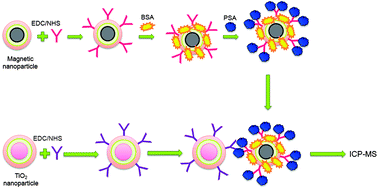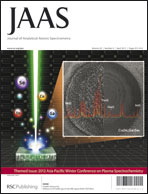Determination of prostate-specific antigen (PSA) tagged with TiO2 nanoparticles using ICP-MS†
Abstract
An ultrasensitive analytical method was developed to determine prostate specific antigen (PSA) tagged with TiO2 nanoparticles (NPs) using inductively coupled plasma mass spectrometry (ICP-MS). The synthesized TiO2 NPs (19.8 nm) were modified with monoclonal antibody, IgG, for tagging on the PSA through the antigen–antibody reaction. For the sample pretreatment, magnetic NPs (MNPs) were also synthesized and modified for the collection of PSA in a serum sample. The sandwiched complexes thereby obtained were collected using a permanent magnet in order to remove any remaining unbound particles. The MNPs were then eliminated after the cleavage of antigen–antibody bindings by treatment with 0.33 M nitric acid. The concentration of the TiO2 NPs remaining in the solution was determined by ICP-MS with a flow injection system and a 10 μL injection loop. The PSA concentration was determined by measuring the 49Ti signal of the tagged TiO2 NPs. The obtained limit of detection for PSA in serum was 1.16 fg mL−1, which was more than 3.44 × 106 times lower than the current PSA levels for cancer diagnosis.


 Please wait while we load your content...
Please wait while we load your content...